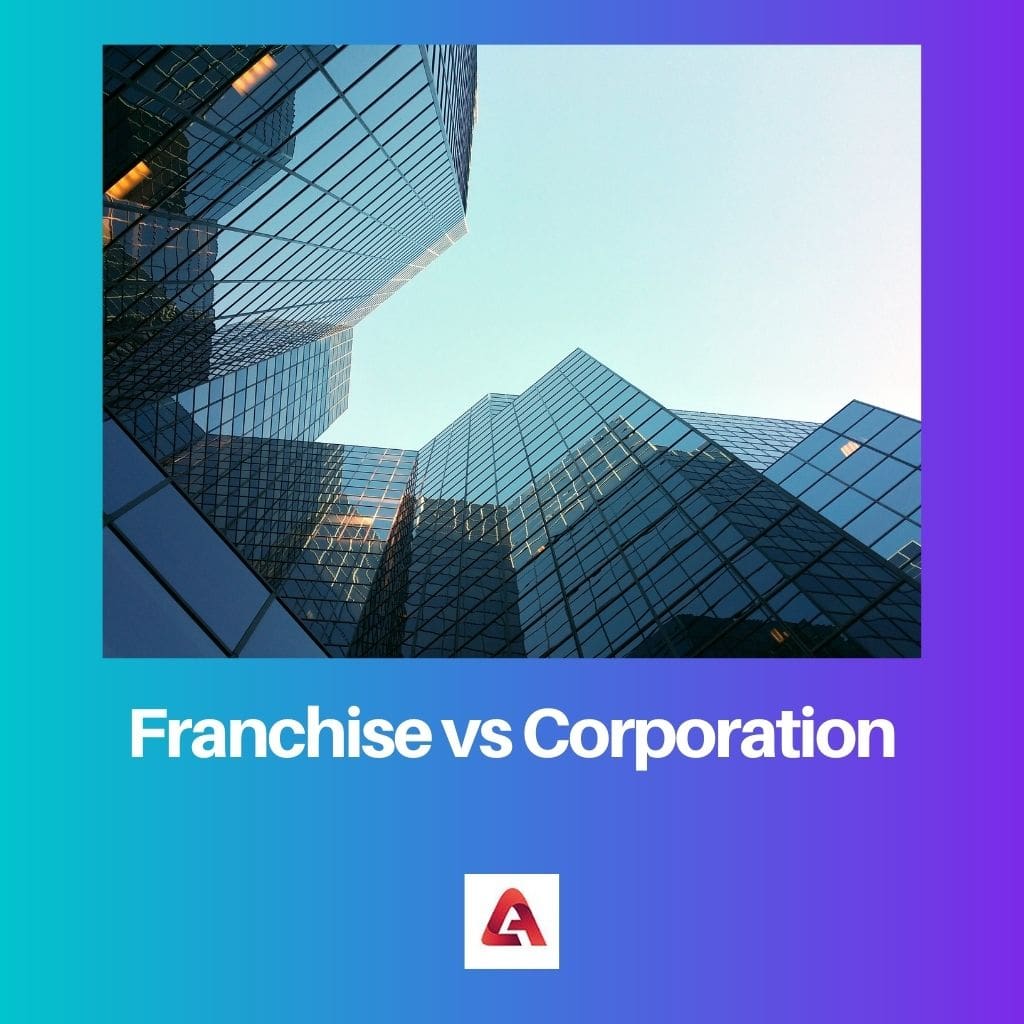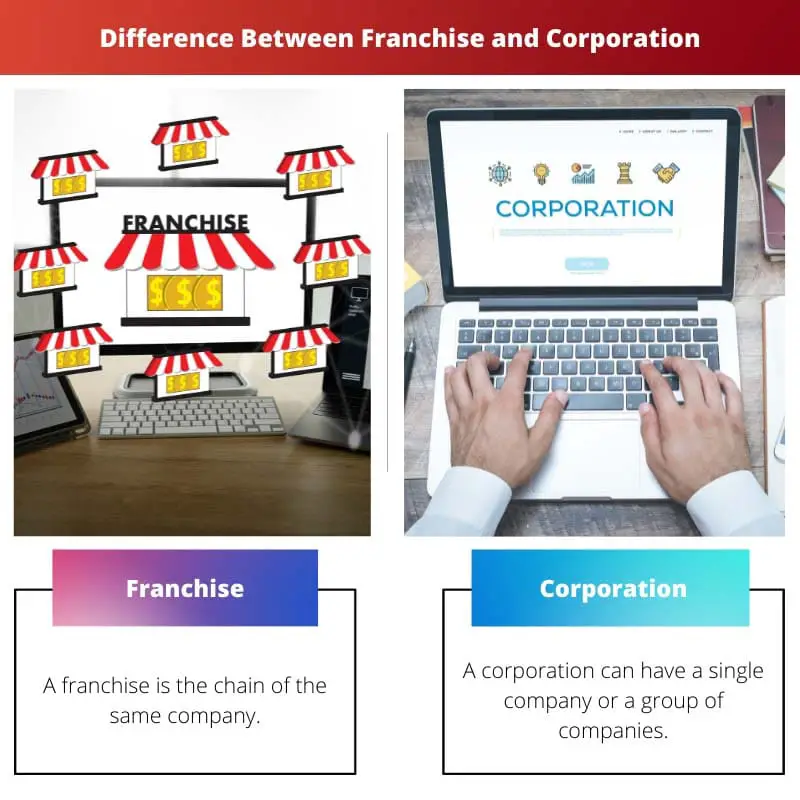Franchising is licensing proprietary information, such as trademarks, business names, logos, etc., to a third party. This is a preferred method to establish business and enter highly competitive markets.
It also enables the company to expand and enter new markets, establishing a more extensive customer base.
Key Takeaways
- A franchise is a business model in which an individual or group (the franchisee) is granted the right to operate a business using the branding, products, and services of an established company (the franchisor) in exchange for fees and royalties.
- A corporation is a legal business entity, separate from its owners, that can operate independently and is subject to specific laws, regulations, and taxation structures.
- Franchises and corporations differ in business structure, with franchises offering a more structured approach and support from the franchisor, while corporations provide greater independence and flexibility in business operations.
Franchise vs Corporation
A franchise is a business in which different stores or branches are owned by separate individuals solely responsible for the daily operations of that location but operates under license from the parent company. A corporation is a large company that runs all its business outlets.

A corporation is a business that shareholders own. It has a separate legal entity, i.e., it is considered separate from its owners.
Simply put, it is considered a legal person in the eyes of the law. Where a Franchise is a method to expand, a corporation is an entity whose expansion is facilitated by franchising.
Comparison Table
| Parameters of Comparison | Franchise | Corporation |
|---|---|---|
| Meaning | A franchise is a chain of the same company. | A corporation can have a single company or a group of companies. |
| Ownership | Individuals own a franchise. | Shareholders own a corporation. |
| Control | The Franchisor controls a franchise | A Corporation is governed by the Board of Directors (BoD) |
| Liability | In a franchise, a Franchisor is liable for the franchisee’s actions. | Since shareholders own corporations, they have limited liability. |
| Income | A franchisor gets royalty payments for giving rights to the usage of trademarks, etc. | A corporation depends on investors’ sale and purchase of shares and investments. |
What is Franchise?
A franchise is created when a brand/company wants to expand its operation. This business model existed because of Isaac Singer in the mid–19th century.
He invented the sewing machine and then used the method of franchising to distribute it. In franchising, a franchisor (the owner) gives the rights/license to use the proprietary information, such as trademark, business name, logo, etc., to the franchisee.
In return, the Franchisor asks for a fee known as a royalty. This helps the Franchisor increase its reach geographically with minimum costs and strengthen the brand name by increasing its availability globally.
It is a preferred method for people who want to start a business and enter highly competitive industries, like giving competition to eating joints. The franchises are regulated by the Federal Trade Commission (FTC) regulation established in 1979.
Then states have different regulatory authorities in alignment with the global regulation to monitor the activities of the franchise. Franchising does not mean that the ownership rights of the Franchisor have been transferred to the franchisee.
It is more like a lease or a contract that has to be renewed. If the terms and conditions of the agreement are violated, the franchisee is subject to the law.
Franchising provides the advantage of having a ready-made business model that can be used right away and quick income generation because the brand name is established. But then there are some disadvantages as well.
For the franchisee, paying regular royalty can be a burden, and the person might want to start their own business.

What is Corporation?
A corporation is a legally established body created by the law. Like any other living person, it has certain rights, such as the right to enter into contracts and borrow money.
It is owned by shareholders and is regulated by the Board of Directors (BoD). It is also liable to pay taxes and has the right to own assets.
Corporations might be formed to earn profit or for social purposes. Legal procedures incorporate a corporation, and the rules differ for the state in which the corporation is being registered.
The shareholders get a vote to elect the management of the corporation. Sometimes, a corporation might be dissolved, which is known as liquidation.
In this process, all the external liabilities are paid first, and then the internal liabilities are paid off.
The shareholders get the leftover value. There are many advantages to having a corporation.
All the shareholders in the corporation have limited liability. That means they are liable to the extent of their share in the company’s share capital.
They also get payments in the form of dividends and have the right to sell their shares or purchase more shares. A corporation also has a perpetual life since it is a person created by law; the law can only dissolve it.
But then, corporations have excessive tax filing activities.

Main Differences Between Franchise and Corporation
- A franchise is owned franchisee who has gained rights over the usage of proprietary information from the Franchisor. In contrast, a corporation is owned by shareholders.
- A franchise is regulated by the rules of the contract and the Federal Trade Commission (FTC) regulations. On the other hand, a corporation is regulated by the Board of Directors (BoD).
- A franchisor receives payment in the name of royalty from the franchisee. On the other hand, shareholders receive dividends, and corporations receive investments.
- The Franchisor is liable for the franchisee’s activities and can also use the franchisee to violate the contract agreements. In contrast, shareholders in a corporation have limited liability.
- A franchise is a chain of outlets of the same company in different locations for expansion, whereas a corporation is a legal entity.

- https://www.sciencedirect.com/science/article/pii/S0883902600000689
- https://scholarship.law.wm.edu/cgi/viewcontent.cgi?article=2174&context=wmlr

The comparison between franchising and corporations is well-articulated and informative, shedding light on the ownership, control, and income aspects of these business models.
I found the detailed explanation of franchising and corporations to be quite enlightening. It clarifies the differences, making it easier for potential business owners to make informed decisions.
Indeed, the article effectively demonstrates the distinctions in liability and income generation between franchises and corporations.
This article delivers a well-rounded explanation of franchising and corporations, serving as an educational guide for readers interested in the nuances of these business models.
While the article presents a comprehensive comparison between franchising and corporations, it would benefit from a deeper analysis of the regulatory and legal frameworks governing these entities.
I understand your point, and it would be valuable to explore the legal intricacies in more detail to provide a nuanced perspective on franchising and corporations.
While the article does provide valuable insights, it may benefit from some real-world examples or case studies to further illustrate the practical implications of franchising and corporations.
This article thoroughly explains the essence of franchising and corporations, portraying their distinct features and benefits. A useful resource for aspiring entrepreneurs.
I agree, the article effectively outlines the pros and cons of franchising and corporations, offering valuable insights for individuals exploring business opportunities.
The comparison table is particularly insightful, providing a clear differentiation between franchising and corporations. It enhances the understanding of their distinct attributes.
This article provides a great insight into how franchising and corporations differ in business structure and operations. It’s a valuable resource for those considering these models for their business ventures.
Definitely, the comparison table is particularly helpful in understanding the distinctions between franchises and corporations. Well-written and informative.
The article offers an insightful portrayal of franchising and corporations, highlighting their distinct characteristics and functions. A valuable resource for business-minded individuals.
Absolutely, the comprehensive explanation of the franchising and corporate models is beneficial for entrepreneurs seeking to gain a deeper understanding of these business structures.
The article offers a clear understanding of the legal and operational aspects of franchising and corporations. Very informative and useful for investors.
This article effectively elaborates on the fundamental differences between franchising and corporations, providing valuable insights for those navigating the business landscape.
Indeed, the article’s depth of analysis brings clarity to the complexities of franchising and corporations, making it a compelling resource for business enthusiasts.
This is an insightful comparison between franchising and corporations, highlighting the key differences and benefits of each business model. It’s a great read for anyone interested in business.
Absolutely, this article provides a comprehensive overview, making it easier to understand the nuances of franchising and corporations.
I couldn’t agree more. The detailed explanation of franchising and corporations is beneficial for entrepreneurs looking to enter new markets.